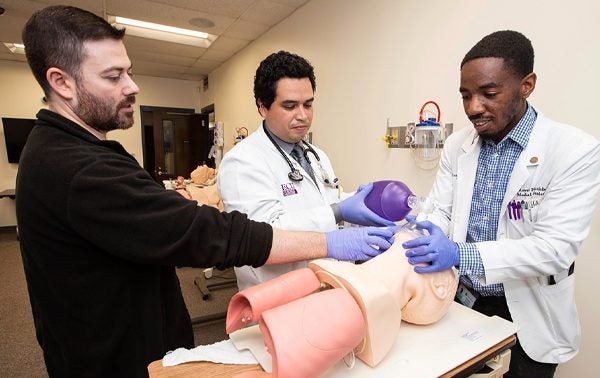Brody School of Medicine receives full accreditation from LCME
The medical education program at East Carolina University’s Brody School of Medicine was recently granted full accreditation by the Liaison Committee on Medical Education (LCME) for an eight-year term.
Most state boards of licensure require that U.S. medical schools granting the MD degree be accredited by the LCME as a condition for licensure of their graduates. As part of this process, programs are required to demonstrate that their graduates exhibit professional competencies that are appropriate for entry to the next stage of their training and that serve as the foundation for proficient medical care.
“This full accreditation speaks to a rigorous set of checks and balances to denote the quality of the education we provide and the quality of the organizational processes of our medical school,” said Dr. Kendall Campbell, Brody’s senior associate dean for academic affairs.

Third-year medical students take part in an internal medicine clerkship in the Interprofessional Professional Clinical Simulation Center at ECU’s Brody School of Medicine. (Photo taken pre-COVID-19 by Rhett Butler)
Planning for the accreditation process usually begins about three years before an accreditation visit. It consists of identifying a faculty accreditation lead and defining several committees to oversee the writing of documents that the medical schools must submit to the LCME. Those committees consist of department chairs, administrators, faculty and students. The Brody School of Medicine had six committees for this accreditation process.
“Almost every faculty member that works with students in some way was involved, most through committee and subcommittee work,” said Campbell, adding that leaders from agencies that partner with ECU on medical education, including Vidant Health and Cherry Hospital, were also involved in the process.
Even though the Brody School of Medicine now has a full eight-year accreditation – the next full survey for accreditation is not until the 2027-2028 academic year – Campbell said accreditation is a “living process” and that the school will continue to do the work of accreditation, with immediate efforts focused through its data office and Committee on Quality Improvement.
“As medical education evolves, the curriculum will evolve with it, with more integration in the curriculum and a greater focus on what physicians will need to look like and be trained for in the future,” Campbell said.
The accreditation can provide the communities, patients and students that the Brody School of Medicine serves with an added level of confidence.
“They have a medical school that has met a series of rigorous standards in training medical students who will go out to serve the communities of eastern North Carolina,” Campbell said. “We had a lot of work to do to get the curriculum updated for the LCME and I am happy at how the school rallied around this work to get us through the process with a full eight years of accreditation.”